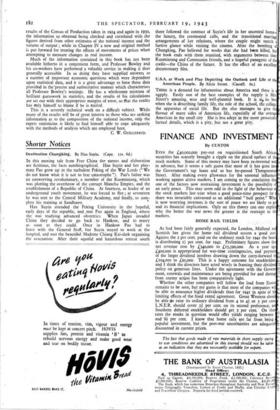FINANCE AND INVESTMENT
By CUSTOS EVEN the £40,000,000 pay-out on requisitioned South Africa securities has scarcely brought a ripple on the placid surface of th stock markets. Some of this money may have been re-invested we in advance, but it seems a safe guess that most of it has gone int the Government's tap loans and so has by-passed Throgmorto Street. After making every allowance for the seasonal influence working against active markets, I am coming to the conclusion tha one of the factors now restraining investment is the possibility an early peace. This may seem odd in the light of the behaviour the stock markets last year when a good peace-time .prospect for share was invariably canvassed- as an additional " bull point." Wha is now worrying investors is the sort of peace we are likely to ge and its financial implications. Only on this theory can one explai why the better the war news the greater is the restraint in th markets.
HOME RAIL YIELDS
As had been fairly generally expected, the London, Midland an Scottish has given the home rail dividend season a good start Against the 2 per cent. paid on the ordinary stock for 1941 the boar is distributing 21 per cent. for 1942. Preliminary figures show tha net revenue rose by £340,000 to L15,590,000. As a year ago £400,000 is appropriated for war-time contingencies, and paymen of the larger dividend involves drawing down the carry-forward b £104,000 to £95,000. This is a happy outcome for stockholders and I think the directors have acted wisely in framing their dividen' policy on generous lines. Under the agreement with the Govern ment, renewals and maintenance are being provided for and damag from enemy action has been comparatively light.
Whether the other companies will follow the lead from Eusto' remains to be seen, but my guess is that most of the companies w be able to announce higher dividends than for 1941 in spite of th limiting effects of the fixed rental agreement. Great Western shot' be able jo raise its ordinary dividend from 4 to 41 or 5 per cen L.N.E.R. should cover 21 per cent. on its second preference, a Southern deferred stockholders should get 2 per cent. On thes rates the stocks in question would offer yields ranging between and' 81 per cent. I know that home rails are far from being popular investment, but the post-war uncertainties are adequatel discounted in current prices.
The fact that goods made of raw materials in short supply owing to war conditions are advertised in this journal should not be taken as an indication that they are necessarily available for export.


























 Previous page
Previous page